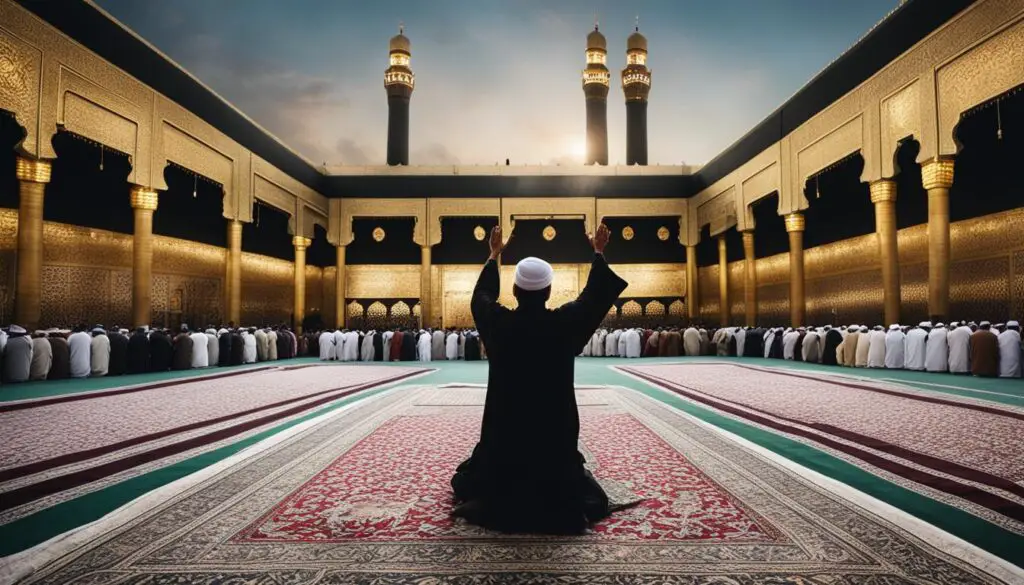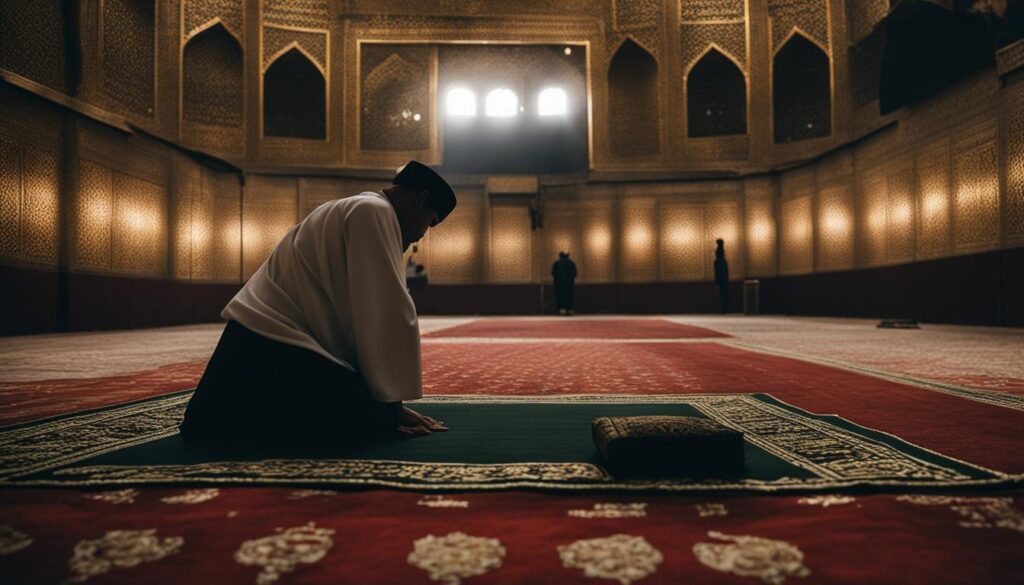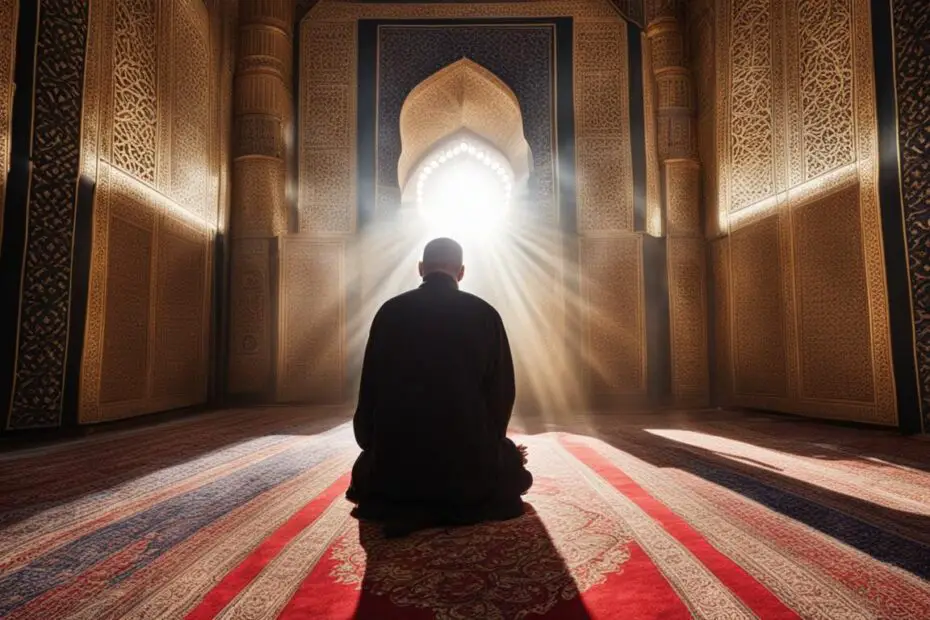Islamic prayer methods are an essential aspect of the Islamic faith. This comprehensive guide will provide step-by-step instructions on how to perform the five daily prayers in Islam. From the importance of prayer in Islam to the specific rituals and techniques involved, this guide will help beginners and experienced practitioners enhance their spiritual growth and deepen their understanding of Islamic traditions.
Key Takeaways:
- Islamic prayer methods are crucial for believers to connect with Allah and strengthen their faith.
- Prayer in Islam is emphasized in the Quran and offers numerous spiritual benefits.
- Salah, the Islamic prayer, involves specific postures, recitations, and timings.
- Learning how to pray in Islam requires following a step-by-step guide and understanding the importance of purification (Tahaarah).
- Performing the obligatory prayers punctually and observing the non-compulsory prayers (sunnah) are highly encouraged.
The Importance of Prayer in Islam
Salah, or prayer, is one of the fundamental pillars of Islam. It is not only a religious duty but also a means of connecting with Allah. The importance of prayer is emphasized in the Quran, where Allah says that successful believers are those who are humble in their prayers. Prayer is seen as a key to success in this world and the hereafter, and it is believed that it keeps believers from committing sins and strengthens their faith. The act of prayer itself is considered a good deed that can erase previous sins.
Prayer in Islam holds great significance, as it is a way for Muslims to establish a direct relationship with Allah. Through prayer, Muslims express their devotion, seek guidance, and seek forgiveness for their sins. It is a personal and intimate form of worship that encourages humility and spiritual growth. The act of prayer also serves as a reminder of the believer’s dependence on Allah and the need for constant gratitude and submission.
“Prayer is the key to heaven; worship is the key to prayer.”
Islamic prayer methods offer several benefits to the individuals who engage in the practice. On a physical level, prayer involves various movements and postures, which can improve flexibility, balance, and overall health. The rhythmic motions of prayer can also have a calming and meditative effect on the mind, reducing stress and promoting a sense of tranquility.
In addition, regular prayer has been shown to have psychological and emotional benefits. It provides a sense of structure and routine, promoting discipline and self-control. Prayer also allows individuals to express and process their emotions, seek solace during difficult times, and find peace and contentment in their faith. Overall, prayer in Islam offers believers a holistic approach to well-being, encompassing the physical, mental, and spiritual dimensions of life.

The Spiritual Benefits of Prayer
Prayer is not only a physical act but also a spiritual practice that can lead to profound spiritual growth. Through prayer, Muslims seek to strengthen their connection with Allah, seek His guidance, and cultivate a deep sense of faith and devotion. The act of prayer allows individuals to reflect on their actions, seek forgiveness for their sins, and seek guidance in making righteous choices.
“Prayer is a conversation with God, and every conversation begins with a greeting.”
Moreover, prayer serves as a means of self-discipline and self-improvement. By establishing a daily prayer routine, individuals develop a sense of responsibility and consistency. This commitment to regular prayer fosters discipline, self-control, and mindfulness, leading to personal growth and spiritual development.
The spiritual benefits of prayer are not limited to the individual. Prayer also fosters a sense of unity and community among Muslims. It is a collective act of worship that brings believers together, reinforcing the bonds of brotherhood and sisterhood. Through congregational prayer, Muslims find solace, support, and a shared sense of purpose within the community.
Table: Benefits of Islamic Prayer Methods
| Physical Benefits | Psychological Benefits | Spiritual Benefits |
|---|---|---|
| Improves flexibility and balance | Reduces stress and promotes tranquility | Strengthens the bond with Allah |
| Promotes physical health and well-being | Provides structure and routine | Encourages self-reflection and seeking forgiveness |
| Enhances focus and concentration | Fosters discipline and self-control | Cultivates a sense of devotion and gratitude |
- Physical Benefits: Improved flexibility and balance, overall health and well-being.
- Psychological Benefits: Reduced stress, tranquility, emotional well-being.
- Spiritual Benefits: Strengthened bond with Allah, self-reflection, devotion, and gratitude.
Overall, the importance of prayer in Islam cannot be overstated. It serves as a means of connecting with Allah, seeking spiritual growth, and finding peace and solace in times of hardship. Through the practice of prayer, Muslims deepen their faith, cultivate discipline and self-control, and strengthen their relationship with their Creator.
Understanding Salah: The Islamic Prayer
The Islamic prayer, also known as Salah, is a structured and ritualistic act of worship that holds great significance in the Islamic faith. It consists of various physical postures and recitations, each with its own unique significance and purpose. Understanding the different types of Islamic prayers and the rituals involved is crucial for Muslims to perform Salah correctly and with utmost devotion.
There are five daily prayers in Islam, known as Fajr, Dhuhr, Asr, Maghrib, and Isha. Each prayer has a specific number of units, or raka’ahs, and includes distinct physical movements such as standing, bowing, prostration, and sitting. The recitation of specific verses from the Quran is an integral part of the prayer, emphasizing the connection between the worshipper and Allah.
The Islamic prayer rituals in Salah symbolize submission, humility, and gratitude to Allah. They serve as a means of seeking forgiveness, expressing gratitude, and seeking guidance and blessings. By adhering to the prescribed rituals and understanding the meaning behind each posture and recitation, Muslims can deepen their spiritual connection and experience the profound benefits of Salah.

The Raka’ahs and Movements in Islamic Prayer
To provide a comprehensive understanding of the Islamic prayer, the table below outlines the number of raka’ahs and the associated movements for each of the five daily prayers:
| Prayer | Number of Raka’ahs | Movements |
|---|---|---|
| Fajr | 2 | Standing, bowing, prostration, sitting |
| Dhuhr | 4 | Standing, bowing, prostration, sitting |
| Asr | 4 | Standing, bowing, prostration, sitting |
| Maghrib | 3 | Standing, bowing, prostration, sitting |
| Isha | 4 | Standing, bowing, prostration, sitting |
It is important to note that the number of movements and recitations may vary slightly depending on the specific school of thought within Islam. However, the overall essence and purpose of the Islamic prayer remain the same.
Learning How to Pray: A Step-by-Step Guide
Learning how to pray in Islam is an important and fundamental practice for Muslims. Whether you are a beginner or looking to refresh your knowledge, this step-by-step guide will provide you with the necessary instructions to perform traditional Islamic prayer methods. Following these steps will help you develop a deeper understanding of the rituals involved and ensure that you perform your prayers with sincerity and devotion.
“Prayer is the key to heaven, and the key to prayer is ablution (wudu).” – Prophet Muhammad (PBUH)
Step 1: Making Intention
Before starting your prayer, it is essential to make a sincere intention in your heart. Intentions are not verbally expressed, but they should be for the sake of Allah with complete focus and devotion.
Step 2: Perform Wudu
Prior to each prayer, perform ablution (wudu) to purify yourself. Start by washing your hands, then your mouth and nose, face, arms up to the elbows, wipe over your head, wash your feet, and finally, recite the declaration of faith. It is important to perform each step of wudu correctly and in the specified order.
Step 3: Stand and Face Qibla
Position yourself in a clean and appropriate space, facing the Kaaba in Mecca. Stand with your feet shoulder-width apart, your hands by your sides, and focus your attention on the intention of prayer.
Step 4: Recite Opening Supplications
Begin your prayer by raising your hands to your ears, saying “Allahu Akbar” (Allah is the Greatest). Then, recite opening supplications (optional) to seek refuge in Allah from any distractions or negative influences.
Step 5: Perform the Prayer
Follow the specific movements and recitations for each unit (raka’ah) of the prayer. This includes standing, bowing, prostrating, and sitting, while reciting prescribed verses from the Quran. Repeat these movements and recitations as required for each prayer.
By following this step-by-step guide, you can learn how to pray in Islam and embark on a meaningful journey of spiritual connection with Allah. Remember to approach each prayer with sincerity and reverence, allowing the act of prayer to bring you closer to your faith and provide solace in your daily life.
Purification for Prayer: Tahaarah
Before performing Salah, Muslims must undergo a process of purification known as Tahaarah. This essential practice ensures physical cleanliness and spiritual preparation for prayer. The act of purification involves performing Wudu, a ritual washing of specific body parts using water. This cleansing process not only removes physical impurities but also symbolizes the cleansing of the soul and the readiness to stand before Allah.
To perform Wudu, the following steps are followed:
- Begin by making the intention (niyyah) to perform Wudu solely for the sake of Allah.
- Start by washing the hands up to the wrists three times, ensuring that water reaches every part.
- Then, rinse the mouth three times, making sure to cleanse thoroughly.
- Gently sniff water into the nostrils and blow it out, ensuring proper cleansing three times.
- Wash the face, from the hairline to the chin and from ear to ear, making sure every part is covered.
- Wash the right arm from the wrist to the elbow three times, ensuring water reaches all areas.
- Follow the same process for the left arm, making sure to cleanse carefully.
- Wipe the head once, passing the wet hands over the entire head from front to back.
- Finally, wash the feet, starting from the right foot and ensuring that water reaches every part up to the ankles three times.
Performing Wudu is an essential part of preparing for Salah. It not only cleanses the physical body but also purifies the mind and soul, allowing the worshipper to approach prayer with a focused and pure state of mind. By performing Wudu correctly and with sincerity, Muslims can enhance their connection with Allah and experience the spiritual benefits of prayer.

The Five Daily Prayers
The five daily prayers, also known as the obligatory prayers, are an integral part of the Islamic faith. Muslims are required to perform these prayers at specific times throughout the day. Each prayer has a unique name and consists of a specific number of units, or raka’ahs. It is crucial for Muslims to learn and understand the names and times of the five daily prayers to fulfill their religious obligations.
1. Fajr (Dawn): This prayer is performed before sunrise and consists of two raka’ahs. It is the first prayer of the day and holds great significance in connecting with Allah and seeking His blessings for the day ahead.
2. Dhuhr (Noon): This prayer is performed after the sun has passed its zenith, typically around midday. It consists of four raka’ahs and serves as a reminder to pause from worldly activities and refocus on spiritual connection.
3. Asr (Afternoon): This prayer is performed in the late afternoon, before sunset. It consists of four raka’ahs and serves as a time for reflection and seeking forgiveness from Allah.
4. Maghrib (Sunset): This prayer is performed immediately after sunset and consists of three raka’ahs. It marks the end of the day and offers an opportunity for gratitude and supplication.
5. Isha (Night): This prayer is performed after twilight has disappeared and consists of four raka’ahs. It is the final prayer of the day and serves as a moment of self-reflection and seeking forgiveness before restful sleep.
| Prayer Name | Number of Raka’ahs | Approximate Timing |
|---|---|---|
| Fajr | 2 | Before sunrise |
| Dhuhr | 4 | Midday |
| Asr | 4 | Afternoon |
| Maghrib | 3 | Sunset |
| Isha | 4 | Night |
Performing the five daily prayers helps Muslims maintain a strong spiritual connection with Allah and fosters discipline, mindfulness, and gratitude in their daily lives. It is a way to seek forgiveness, express gratitude, and find solace in the midst of life’s challenges. By adhering to the prescribed times and rituals of the five daily prayers, Muslims are able to strengthen their faith and experience the spiritual benefits that come with regular worship.
The Compulsory and Non-Compulsory Prayers
In addition to the obligatory prayers, there are also non-compulsory prayers known as sunnah prayers. The five daily prayers, Fajr, Dhuhr, Asr, Maghrib, and Isha, are considered compulsory and must be performed by all practicing Muslims. These prayers consist of specific units or raka’ahs that are performed in a prescribed manner. Each prayer has its own unique set of movements and recitations, all of which are integral to the prayer itself.
Sunnah prayers, on the other hand, are additional prayers that are highly recommended but not obligatory. They provide Muslims with the opportunity to earn extra rewards and strengthen their connection with Allah. Sunnah prayers can be performed both before and after the compulsory prayers, and they can also be performed individually at any time throughout the day or night. While they are not mandatory, they hold great spiritual benefit for those who choose to perform them.
To better understand the distinction between the compulsory and non-compulsory prayers, let’s take a closer look at the table below:
| Compulsory Prayers | Number of Raka’ahs | Timing |
|---|---|---|
| Fajr | 2 | Before sunrise |
| Dhuhr | 4 | After the sun passes its zenith |
| Asr | 4 | In the afternoon |
| Maghrib | 3 | After sunset |
| Isha | 4 | After twilight until midnight |
| Sunnah Prayers | Number of Raka’ahs | Timing |
|---|---|---|
| Sunnah Muakkadah | 2 | Before and after Dhuhr |
| Sunnah Muakkadah | 2 | After Maghrib |
| Sunnah Ghair Muakkadah | 2 | Anytime throughout the day |
It is important for Muslims to prioritize the compulsory prayers and ensure they are performed on time. By doing so, they fulfill one of the fundamental obligations of their faith. Engaging in sunnah prayers, however, offers additional opportunities for worship and spiritual growth. Muslims are encouraged to incorporate these non-compulsory prayers into their daily routine to reap the benefits and draw closer to Allah.

Importance of Wudu: The Ritual Washing
Wudu, also known as ablution, holds great significance in Islam. It is a prerequisite for performing Salah, the Islamic prayer, and is considered a form of physical and spiritual purification. By performing Wudu, Muslims cleanse themselves from impurities and prepare themselves to stand before Allah in prayer.
Wudu involves a specific sequence of actions, including washing the hands, mouth, nose, face, arms, and feet. Each step of Wudu has its own significance, symbolizing the removal of sins and the purification of the body and soul. It is a physical act of worship that demonstrates humility, obedience, and devotion to Allah.
“When a Muslim or a believer washes his face (in the course of Wudu), every sin which he committed with his eyes is washed away from his face with water, or with the last drop of water; when he washes his hands, every sin which is committed by his hands is effaced from his hands with the water, or with the last drop of water; and when he washes his feet, every sin his feet committed is washed away with the water or with the last drop of water, with the result that he comes out pure from all sins.” – Sahih Muslim
Besides its spiritual significance, Wudu also offers several benefits to the individual. It helps to establish a sense of ritual and discipline in the daily life of a Muslim. The physical actions involved in Wudu promote cleanliness and hygiene, which are essential for maintaining good health. Additionally, the ablution process serves as a moment of reflection and focus, allowing individuals to mentally prepare themselves for prayer.

| Benefits of Wudu | Explanation |
|---|---|
| Physical cleanliness | Wudu helps cleanse the body and maintain hygiene, preventing the spread of germs and diseases. |
| Spiritual purification | The ritual of Wudu symbolizes the purification of the soul, washing away sins and impurities. |
| Mental focus | Performing Wudu serves as a moment of reflection, allowing individuals to clear their minds and focus on their connection with Allah. |
| Establishes discipline | Regularly performing Wudu helps individuals establish a sense of ritual and discipline in their daily lives. |
In conclusion, Wudu is an integral part of Salah and plays a vital role in the lives of Muslims. It not only prepares individuals for prayer but also promotes physical cleanliness, spiritual purification, mental focus, and discipline. By performing Wudu with sincerity and understanding its significance, Muslims can enhance their connection with Allah and experience the manifold benefits of this sacred ritual.
The Spiritual Benefits of Salah
Salah, the Islamic prayer, offers numerous spiritual benefits for Muslims. It serves as a means of connecting with Allah, seeking His forgiveness, and expressing gratitude and humility. Through the act of prayer, Muslims establish a direct line of communication with the divine and experience a deep sense of spiritual fulfillment.
Regular prayer cultivates discipline, self-control, and mindfulness. When engaged in prayer, individuals are encouraged to fully focus their attention on their relationship with Allah, shutting out distractions and worldly concerns. This practice of mindfulness enhances concentration and helps individuals achieve a state of tranquility and inner peace.
Furthermore, Salah provides an opportunity for self-reflection and increased self-awareness. During prayer, Muslims introspectively examine their actions, intentions, and thoughts, seeking personal growth and spiritual development. This process of self-reflection allows individuals to identify areas for improvement, seek forgiveness for their shortcomings, and strive to become better versions of themselves.
| The Spiritual Benefits of Salah |
|---|
| “Salah serves as a means of connecting with Allah, seeking His forgiveness, and expressing gratitude and humility.” |
| “Regular prayer cultivates discipline, self-control, and mindfulness.” |
| “Salah provides an opportunity for self-reflection and increased self-awareness.” |
The Significance of Prayer in Islam
“Prayer is the key to success in this world and the hereafter. It keeps believers from committing sins and strengthens their faith.”
The significance of prayer in Islam is profound. It is considered a fundamental pillar of the faith and an essential act of worship. Prayer is not only a means of seeking Allah’s blessings and protection but also a way to align one’s actions and intentions with Islamic teachings. It serves as a reminder of the believer’s purpose in life and helps them develop a closer relationship with their Creator.
- Prayer acts as a spiritual anchor, grounding individuals in their faith and providing them with a sense of purpose and direction.
- It serves as a constant reminder of one’s duties and responsibilities as a Muslim, promoting a righteous and ethical way of life.
- Through prayer, individuals express their gratitude for the blessings they have received and seek guidance for their future endeavors.
In summary, Salah holds great spiritual significance in Islam. It is a means of connecting with Allah, cultivating discipline and mindfulness, and fostering self-reflection and personal growth. By engaging in regular prayer, Muslims deepen their spirituality, strengthen their faith, and experience the profound rewards and blessings that come with seeking a closer relationship with their Creator.
Prayer Times and Prayer Calendars
The timing of prayer is crucial in Islam. Muslims are required to perform Salah at specific times throughout the day, starting at dawn and ending at night. The precise timing of each prayer is determined by the position of the sun. To ensure punctuality in prayer, many Muslims rely on prayer calendars or use prayer apps that provide accurate prayer times based on their location.
Prayer calendars are useful tools that help Muslims organize their daily prayer schedule. They display the times for each of the five daily prayers, allowing individuals to plan their day around these important spiritual obligations. These calendars can be displayed in various formats, including online platforms, mobile apps, or physical printouts.
Prayer apps are also popular among Muslims, providing convenient access to prayer times, along with additional features such as reminders, Qibla direction, and supplications. These apps use location tracking technology to accurately determine the prayer times based on the user’s geographical location.
| Prayer Time | Time Range |
|---|---|
| Fajr | Before sunrise |
| Dhuhr | After the sun has passed its zenith |
| Asr | In the afternoon, before sunset |
| Maghrib | Immediately after sunset |
| Isha | After twilight, before midnight |
It is important for Muslims to familiarize themselves with the prayer times and adhere to them diligently. By doing so, they demonstrate their commitment to their faith and maintain a strong spiritual connection with Allah. Praying on time allows individuals to experience the full spiritual benefits of Salah and cultivate a sense of discipline and mindfulness in their daily lives.
Conclusion
Islamic prayer methods play a vital role in the lives of Muslims, serving as a means of deepening their spiritual growth and strengthening their connection with Allah. By following the rituals and techniques of prayer, Muslims can experience the profound rewards and blessings that come with Salah.
Through prayer, Muslims not only seek forgiveness, gratitude, and humility but also cultivate discipline, self-control, and mindfulness. It is a time for self-reflection, allowing individuals to nurture their inner peace and tranquility while deepening their connection to their faith.
By performing the obligatory prayers punctually and seeking knowledge and understanding, Muslims can enhance their prayer experience and embark on a journey of spiritual growth. Through the proper practice of Islamic prayer, individuals can strengthen their relationship with Allah and unlock the profound spiritual benefits that Salah brings.
FAQ
What is the significance of prayer in Islam?
Prayer in Islam is considered a religious duty and a means of connecting with Allah. It is emphasized in the Quran as a key to success in this world and the hereafter, strengthening believers’ faith and keeping them from committing sins.
What are the different types of Islamic prayers?
The five daily prayers in Islam are Fajr (dawn), Dhuhr (noon), Asr (afternoon), Maghrib (sunset), and Isha (night). These prayers have specific names and are performed at different times throughout the day.
How do I learn how to pray in Islam?
To learn how to pray in Islam, it is necessary to follow a step-by-step guide. This guide will provide detailed instructions on each posture and recitation involved in the Islamic prayer, helping beginners understand the proper technique and sequence.
What is the process of purification before prayer?
Before performing Salah, Muslims must undergo a process of purification known as Tahaarah. This involves cleansing the body and clothes and performing Wudu, a ritual washing of specific body parts using water.
What are the names and times of the five daily prayers?
The five daily prayers are Fajr (dawn), Dhuhr (noon), Asr (afternoon), Maghrib (sunset), and Isha (night). The precise timing of each prayer varies depending on the position of the sun throughout the day.
Are there any non-compulsory prayers in Islam?
Yes, there are non-compulsory prayers known as sunnah prayers. While the compulsory prayers must be performed, the non-compulsory prayers are highly recommended but not obligatory. They provide additional opportunities for worship and earning extra rewards.
What is the importance of Wudu in Islam?
Wudu, the ritual washing before prayer, is not only a physical cleansing but also a spiritual preparation. It symbolizes spiritual cleansing, removes sins, and invites the blessings of Allah upon the worshipper.
What are the spiritual benefits of Salah?
Salah offers numerous spiritual benefits, including connecting with Allah, seeking forgiveness, expressing gratitude and humility, and experiencing inner peace and tranquility. Regular prayer cultivates discipline, mindfulness, and spiritual growth.
How can I find accurate prayer times?
Muslims often refer to prayer calendars or use prayer apps that provide accurate prayer times based on their location. It is important to pray on time and not delay prayers without a valid reason.
How can Islamic prayer methods enhance spiritual growth?
By following the proper Islamic prayer methods, performing the obligatory prayers punctually, and seeking knowledge and understanding, Muslims can deepen their relationship with Allah, enhance their spiritual growth, and experience the profound rewards and blessings of Salah.









